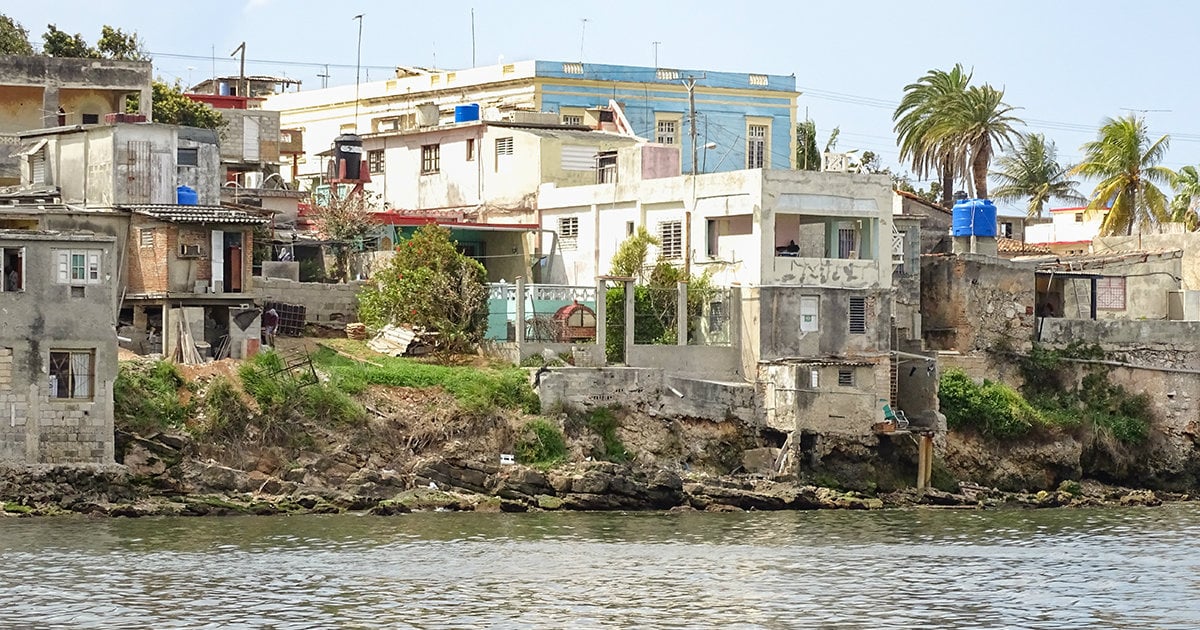
Related videos:
A recent report published by the state-run newspaper Granma highlights the severe housing crisis facing Cuba: only 65% of the existing homes in the country are in good technical condition.
This figure is a direct reflection of decades of neglect, lack of planning, precarious access to quality construction materials, and the impact of natural disasters, which have further worsened the bleak outlook for millions of Cubans.
According to Delilah Díaz Fernández, the general director of Housing, by the end of 2024 the state of Cuba's housing stock remains alarming. Of the 4,078,519 registered homes, only 65% are in acceptable condition.
Even more concerning, 59 municipalities across the country, including ten in Havana, failed to complete the planned basic housing units, an indicator of the failure to implement the Housing Policy.
In addition, of the 8,331 cells approved for the year, 3,461 have yet to be initiated, with Granma leading the list of delays. This province also faces the challenge of eliminating 33,126 earth floors, a clear example of the precarious conditions in which many Cubans live.
More than 12,000 homes in Guantánamo were damaged by Hurricane Oscar, but around 10,000 of them are still waiting for a resolution, Díaz emphasized.
Artemisa faces a similarly alarming situation, with over 18,000 unresolved cases, while in Granma only 1.2% of those affected by the earthquake on November 10 have received a response.
The report reveals a serious shortage of essential construction materials. For instance, the supply of tiles in Artemisa and Guantánamo is only 15% and 26% of what is needed, respectively, while the delivery of cement in these provinces does not exceed 11% in the first case and 26% in the second.
Although some provinces, such as Havana and Santiago de Cuba, have exceeded their material delivery targets, less than 30% of the issues have been resolved.
These figures not only reveal the inadequacy of the allocated resources but also the regime's inability to implement effective solutions to the basic needs of the population.
Even in cases where the materials were delivered, the slow pace and lack of organization have hindered significant results.
The government has announced the construction of 12,183 homes through various means in 2025, as well as the completion of 6,209 homes in the state sector.
However, the current figures and the history of non-compliance suggest that these goals are, at best, optimistic and, at worst, unrealistic.
Meanwhile, the population continues to face a housing deficit that undermines their quality of life and future. The housing crisis is yet another indication of the deterioration of infrastructure and the inefficiency of the Cuban regime.
To understand the extent of the inefficiency of the housing construction program promoted by the Cuban regime, it is enough to point out that, according to official figures from 2021, more than one third of the homes in Cuba are in fair or poor technical condition.
In this context, the Cuban government recently announced the preparation of a future Housing Law, with the aim of presenting the draft in upcoming sessions of the National Assembly of People's Power.
Although the draft proposal is still being written and not all its specifics have been disclosed, during the session of the Agro-Food Commission prior to the Fourth Ordinary Session of the Cuban Parliament, corresponding to the X Legislature, lawmakers learned that the law aims to allow for the possibility of having one house in the city and another in the countryside, under the concept of property, as reported by the official newspaper Granma.
According to this information, the new law aims to ensure compliance with the construction types approved by the Ministry of Construction (Micons) in 2017.
The information was provided during a presentation of the Program for the Attention to the Turquino Plan and Rural Areas in Cuba, which was attended by Cuban Vice President Salvador Valdés Mesa. At that moment, the leader acknowledged the serious decline in living conditions in the country's rural areas, although he insisted that the "achievements of the Revolution" must be defended.
Housing is a crucial issue in everyday life in Cuba, especially since the government does not give it the priority it requires while continuing to build hotels in the country.
Frequently Asked Questions about the Housing Crisis in Cuba
What is the current state of housing in Cuba?
A recent report indicates that only 65% of housing in Cuba is in good technical condition, reflecting a housing crisis exacerbated by a lack of materials, planning, and the impact of natural disasters.
What are the main causes of the housing crisis in Cuba?
The causes of the crisis include decades of neglect, a lack of planning, precarious access to quality materials, and natural disasters. Moreover, the inefficiency of the Cuban regime in implementing effective solutions exacerbates the situation.
What measures is the Cuban government taking to address the housing issue?
The government has announced the construction of 12,183 housing units by 2025 and is working on a new Housing Law. However, the set goals appear to be optimistic and unrealistic, given the history of unmet commitments.
How do natural disasters impact housing conditions in Cuba?
Natural disasters, such as hurricanes and earthquakes, have damaged thousands of homes in provinces like Guantánamo and Granma, further complicating the housing crisis by exceeding the government's ability to provide quick and effective solutions.
What is the public’s response to the government's management of housing issues?
The Cuban population is expressing discontent regarding the government’s prioritization of building tourist infrastructures over housing, and the ongoing lack of proper attention to the basic needs of citizens remains a source of frustration.
Filed under: